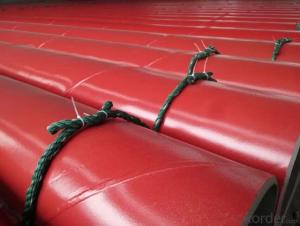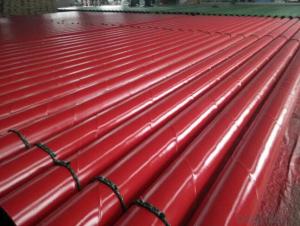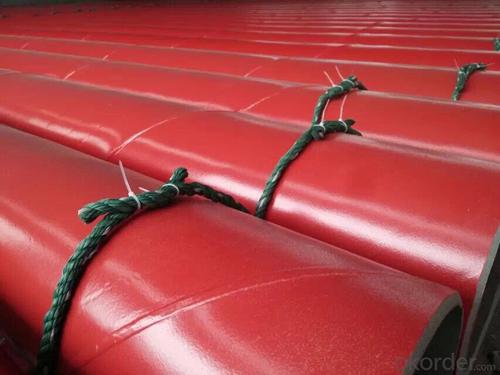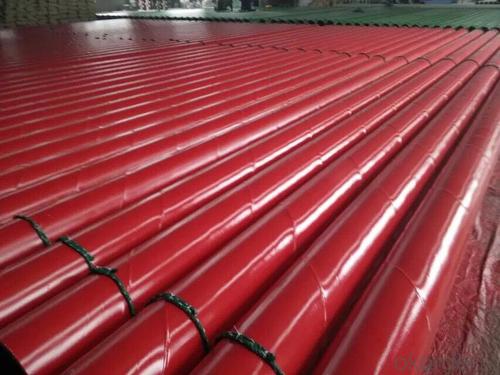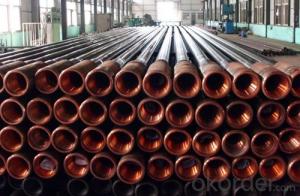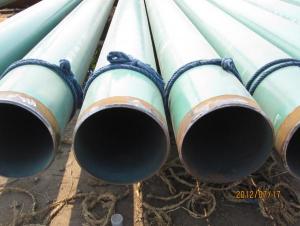seamless 2PE steel pipe external coating
- Loading Port:
- China Main Port
- Payment Terms:
- TT OR LC
- Min Order Qty:
- -
- Supply Capability:
- -
OKorder Service Pledge
OKorder Financial Service
You Might Also Like
Specifications
water pipeline inner-layer tape
1 Butyl rubber as adhesive
2. SGS test report and DVGW certificate
3. corrosion protection
water pipeline inner-layer tape
State-of-the-Art Pipeline Protection for All Climates & Environments
System description:
WATER PIPELINE Inner -layer tape also be called pipe wrap anti-corrosion tape, polyethylene wrap tape.
water pipeline Inner-layer tapeT100 is engineered to assure a high bond to the primed pipe surface with excellent conformability characteristics, aggressive adhesive for corrosion protection and repair of main line coatings.
Inner-layer tapeT100 series is cold applied tape coating system for corrosion protection of Oil, Gas, Petrochemical, and Waste Waterburied pipeline, pipe can be buried, also can be underground ,overhead ,onshore and offshore .
Structure of water pipeline inner wrap tape
The specification of the tape consists of two layers, adhesive layer and film backing
Adhesive: butyl rubber
Film backing: Special blend of stabilized polyethylene
Features & Benefits
Provides a permanent bond to the primed steel pipes surface and provides protection against chemical electrolytic corrosion for underground pipelines.
long term corrosion protection
Worldwide reference lists. Established in-ground history
High chemical resistance under service temperature.
Outstanding electric property and permanent adhesion.
Cold applied, No release liner. Makes installation fast and easy.
Complies with EN-DIN 30672 and AWWAC-214 international standards and also ASTM standards.
Be used for water pipeline corrosion protection
System Properties
Type | T138 | T 150 | T165 | T180 | T 250 | T265 | T280 | |
Thickness | 15mil 0.38mm | 20mil 0.508mm | 25mil 0.635mm | 30mil 0.762mm | 20mil 0.508mm | 25mil 0.635mm | 30mil 0.762mm | |
Backing | 9mil 0.229mm | 9mil 0.241mm | 10mil 0.25mm | 10mil 0.25mm | 15mil 0.38mm | 20mil 0.508mm | 25mil 0635mm | |
Adhesive | 6mil 0.152mm | 11mil 0.279mm | 15mil 0.381mm | 20mil 0.508mm | 5mil 0.127mm | 5mil 0.127mm | 5mil 0.127mm | |
When used for ductile iron pipes inner layer 980-20 or 980-25 and outer layer 955-20 or 955-25 are recommended. | ||||||||
Elongation | ³300% | ³400% | ||||||
Tensile Strength | 55 N/cm | 70 N/cm | ||||||
Color | Black | White | ||||||
Peel Adhesion to Primed Pipe | 33 N/cm | |||||||
Dielectric Strength | 30 KV | |||||||
Dielectric Breakdown | 26 KV/mm | |||||||
Cathodic Disbandment | 0.24 in radius 6.4 mm | |||||||
Water Vapor Transmission Rate | < 0.1% | |||||||
Volume Resistivity | 2.5 x 1015 ohm.cm | |||||||
Impact resistance | 5.5Nm | |||||||
Penetration Resistance | <15% | |||||||
Performance | AWWA C-209,ASTM D 1000,EN 12068 | |||||||
Order information
Length | 100ft(30 M),200ft(60 M),400ft(120 M),800ft(240 M) |
Width | 2’’(50mm),4’’(100mm),6’’(150mm),17’(450mm),32’’(800mm) |
- Q: What materials are used in scaffolding pipes?
- The bamboo scaffold board made of bamboo or bamboo.
- Q: How are steel pipes used in the transportation industry?
- Steel pipes are commonly used in the transportation industry for various purposes such as the construction of pipelines, including oil and gas pipelines, water pipelines, and sewage pipelines. They are also used in the manufacturing of automotive parts, such as exhaust systems, and in the construction of infrastructure such as bridges and tunnels. Additionally, steel pipes are used in the transportation of goods through shipping containers and railway tracks.
- Q: What are the dimensions of a standard steel pipe?
- The dimensions of a standard steel pipe can vary depending on its intended use, but common dimensions include a nominal size (such as 1/2 inch, 1 inch, 2 inches, etc.) and a schedule number indicating its wall thickness (such as Schedule 40 or Schedule 80). The outside diameter of the pipe can range from small sizes of less than half an inch to large sizes of several feet. The length of a standard steel pipe is typically 21 feet, although shorter lengths are also available.
- Q: What are the different types of fittings used with steel pipes?
- There are several types of fittings used with steel pipes, including elbow fittings, tee fittings, coupling fittings, union fittings, and flange fittings.
- Q: What is the role of steel pipes in the transportation of water?
- Steel pipes are of utmost importance in the transportation of water due to their durability and strength. They find extensive use in diverse water supply systems, including municipal water distribution networks, irrigation systems, and industrial water transportation. One of the primary benefits of steel pipes lies in their capacity to endure high pressure and deliver water reliably over long distances. The strength of steel enables the construction of pipelines with larger diameters, facilitating the efficient movement of substantial water volumes. Additionally, steel pipes exhibit remarkable resistance to corrosion, a critical characteristic when conveying water that may contain different minerals, chemicals, or contaminants. The corrosion-resistant properties of steel pipes ensure that the water quality remains uncompromised throughout the transportation process. Furthermore, steel pipes offer exceptional structural integrity, rendering them suitable for both underground and above-ground installations. They can withstand extreme weather conditions, seismic activity, and heavy loads, thereby ensuring the longevity and dependability of the water transportation system. Moreover, steel pipes are easy to install and maintain, apart from being robust and durable. They can be seamlessly welded together, resulting in a pipeline with minimal leakage points. Regular inspections and maintenance help identify potential issues or damages, guaranteeing an uninterrupted flow of water. In conclusion, steel pipes play a critical role in water transportation, serving as a strong and reliable conduit. Their ability to withstand high pressure, resist corrosion, and maintain water quality make them an ideal choice for various water supply systems, contributing to the efficient and sustainable distribution of water resources.
- Q: What are steel pipes made of?
- Steel pipes are made of a strong and durable alloy known as steel, which is primarily composed of iron and carbon, along with small amounts of other elements such as manganese, silicon, and sulfur.
- Q: What's the difference between hot-rolled seamless steel tube and cold-rolled seamless steel tube?
- Cold rolled seamless steel pipe (DIAL) in general, steel pipe for low and medium pressure boiler tube, high-pressure boiler steel pipe, alloy steel pipe, stainless steel pipe, oil cracking tube and other steel tube, including carbon thin-walled steel, alloy thin-walled steel, stainless steel, thin steel tube.
- Q: Can steel pipes be used for heat exchangers?
- Yes, steel pipes can be used for heat exchangers. Steel is a commonly used material for heat exchangers due to its high thermal conductivity and durability. It can efficiently transfer heat between two fluids, making it suitable for various industrial applications.
- Q: How are steel pipes inspected for quality?
- Steel pipes are inspected for quality through a rigorous process that involves various techniques and standards. One common method is visual inspection, where trained professionals examine the pipes for any visible defects such as cracks, dents, or surface irregularities. This visual inspection ensures that the pipes meet the required specifications and are free from any visible flaws. Additionally, non-destructive testing (NDT) methods are employed to evaluate the internal and external quality of the steel pipes. One widely used NDT technique is ultrasonic testing, which involves sending ultrasonic waves through the pipes to detect any internal defects or inconsistencies in the material. This method can identify issues like wall thickness variations, inclusions, or weld defects that may compromise the pipe's integrity. Another popular NDT technique is magnetic particle inspection, which uses magnetic fields and iron particles to identify surface cracks or flaws in the steel pipes. This method is particularly effective for detecting defects in ferromagnetic materials and can be performed on both the outside and inside surfaces of the pipes. Furthermore, hydrostatic testing is often conducted to evaluate the pipes' strength and resistance to pressure. In this process, the pipes are filled with water or another suitable fluid and subjected to a specified pressure to check for leaks or structural weaknesses. This test helps ensure that the pipes are capable of withstanding the intended operational conditions without failure. In addition to these techniques, various quality control measures are implemented throughout the manufacturing process, including material traceability, dimensional checks, and chemical composition analysis. These measures help guarantee that the steel pipes meet the required standards and specifications, ensuring their quality and reliability. Overall, the inspection of steel pipes for quality involves a combination of visual inspection, non-destructive testing methods, and quality control measures. These comprehensive procedures help identify any defects, inconsistencies, or weaknesses, ensuring that the pipes meet the necessary quality standards and are fit for their intended purpose.
- Q: Can steel pipes be used for gas transmission pipelines?
- Yes, steel pipes can be used for gas transmission pipelines. Steel pipes are commonly used in the construction of gas transmission pipelines due to their durability, strength, and resistance to corrosion. Additionally, steel pipes can withstand high pressure and extreme temperatures, making them suitable for the transportation of natural gas over long distances.
Send your message to us
seamless 2PE steel pipe external coating
- Loading Port:
- China Main Port
- Payment Terms:
- TT OR LC
- Min Order Qty:
- -
- Supply Capability:
- -
OKorder Service Pledge
OKorder Financial Service
Similar products
Hot products
Hot Searches
Related keywords
